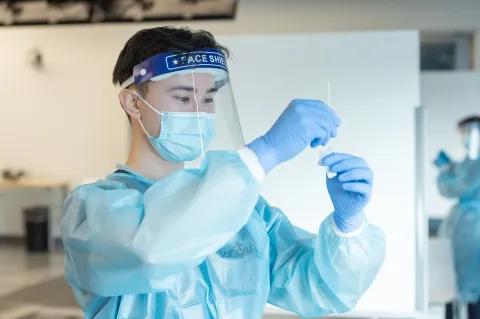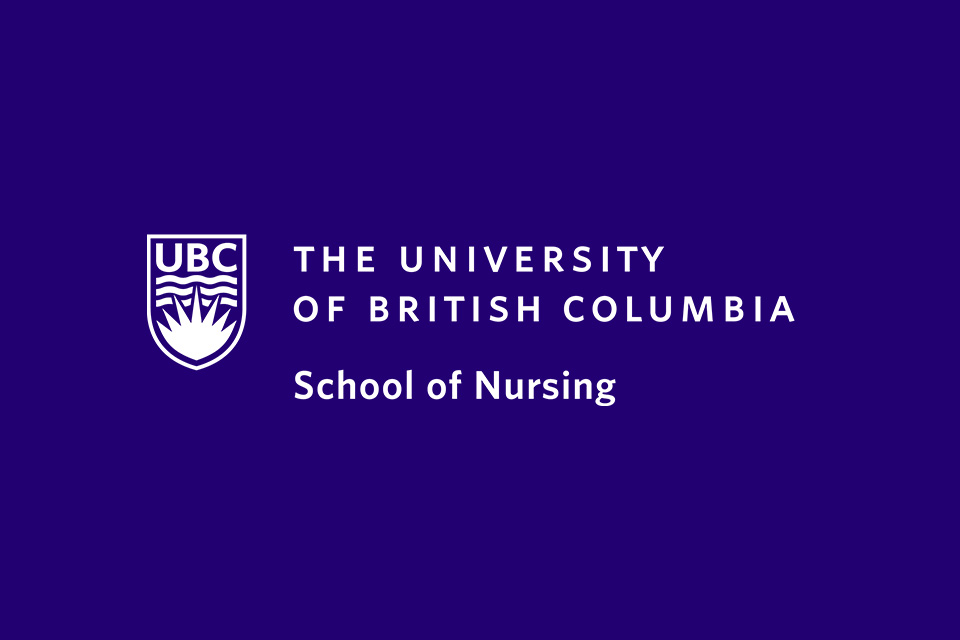
March 4, 2021
Orchard Commons rapid testing was a fantastic experience; I have been following British Columbia’s COVID response since the pandemic began and had wanted to get involved with community testing, so the opportunity to be a part of the BD Veritor initiative was incredibly exciting. Learning about the planning and implementation of such a project has given me a glimpse into the roles and responsibilities of public health and how many individuals work behind the scenes to ensure the safety of our communities, and I am fortunate to have the chance to participate and contribute to this work. Plus, it was great to finally meet some classmates and instructors in person rather than on Zoom!
~ Jordan Edwards, Student Nurse
Such are the types of reflections that student nurses have offered to instructors at the Orchard Commons Rapid Testing Site since it opened on campus early in February. It is no wonder the initiative has received such praise from students. A project so rich in diverse interventions has seldom presented itself at the school before, according to Professor of Teaching Elsie Tan, who is the associate director of the UBC School of Nursing Undergraduate Program. During a pandemic, when some of the usual avenues of practical experience have diminished, such an initiative has provided a unique opportunity to the Bachelor of Science in Nursing (BSN) program.
“This pilot project was initiated to screen asymptomatic students in their first year of residence on campus, for the novel coronavirus, but it has exceeded its main purpose,” says Professor Tan. “In addition to screening first year residents, the nursing students are learning about program planning and delivering a pop-up health screening program.”
As part of the BSN program, students are required to take NURS 362 - Primary Health Care, a practicum course where students are placed in settings that allow them to draw on public health interventions such as “surveillance, planning, coordination, delivery, and evaluation.” Students learn about public health interventions using The Wheel of Intervention and draw on principles of primary health care. Students practice and witness each section of the pie in their experience. “Rarely does one site or project present all these aspects in one practicum. This scope of activity is rare, all-encompassing, and therefore highly valuable for students in NURS 362,” Professor Tan noted.
The initiative allows students to see first-hand how public health principles guide the work in rapid testing and it has helped the instructors to link theory and research concepts to practice.
How did it happen that UBC's School of Nursing was able to take advantage of this experience? Toward the end of 2020, Health Canada reached out to various universities to gauge interest in conducting a roll-out of rapid testing. Rae Ann Aldridge, Executive Director of Risk Management at UBC, introduced the idea to Dr. Elizabeth Saewyc, Director of the School of Nursing, who saw an opportunity to further support UBC’s COVID response while providing a clinical educational site for nursing students, in partnership with Student Housing & Hospitality Services. Infectious disease testing and related health promotion are part of the nursing profession’s scope of practice. Dr. Saewyc immediately brought Professor Tan into the conversation to head the educational aspect of the project.
Ms. Aldridge, Dr. Saewyc, and Professor Tan met in early January to discuss a proposal for the support and management of the enterprise. Professor Tan worked with Primary Health Care course leaders Frances Affleck and Ranjit Dhari to develop this Rapid Testing site into a viable student practicum.
Because Dr. Saewyc currently serves on a World Health Organization Technical Advisory Group for Educational Institutions and COVID19, she recognized UBC would not only be providing Health Canada with valuable data about the use of rapid test screening to prevent COVID transmission on campuses, but the project came with a number of possibilities for related research. She presented the project at one of the WHO TAG meetings to help identify any global questions the site might help inform and found enthusiastic interest around what could be learned. She invited Dr. Sabrina Wong to lead the research and evaluation component, collaborating with Vancouver Coastal Health and Providence Health Care.
Health Canada’s main goal is to determine the feasibility of rolling out rapid-testing using nasal swabbing for COVID-19 screening in areas with a high density of young people living in congregate housing facilities. Just as this project has produced a wealth of learning and teaching about collaboration between primary care and public health in nursing, it has also allowed students to directly apply research concepts from their coursework.
Dr. Wong, who is the school’s associate director of research, was instrumental in developing the clinic and research protocols and providing faculty training on the BD Veritor. She has taken the lead in quality assurance and testing procedures for the program, as well as handling the notifications. Dr. Wong points out, “the COVID rapid screening site provided a real-world opportunity for students to understand concepts such as sensitivity, specificity, and predictive values. In addition, they can see first-hand the bias that could be created by instrumentation (in this case, the technology used to complete the rapid screening) and inter-rater reliability and validity. Students also are able to apply their learning about prevalence and what the concept of risk means. For example, the prevalence of COVID-19 in the target population is low and we nurses need to consider ourselves at low risk of actually becoming infected with COVID when working at this site.”
Finally, students are learning about important concepts related to the nursing code of ethics such as serving in times of pandemics and disasters. They also acquire experience in ethical conduct and serving our clients in a way that meets their own and the publics’ needs.
This project continues to unfold, offering engagement opportunities for others in the School of Nursing. Because the rapid test clinic is operating several days a week, a number of nursing faculty who are not teaching in the primary health care course, graduate students in nursing, and some staff have also volunteered for the clinic on days the undergrad nursing students are not available. We look forward to sharing with the wider community further learnings from Orchard Commons.



